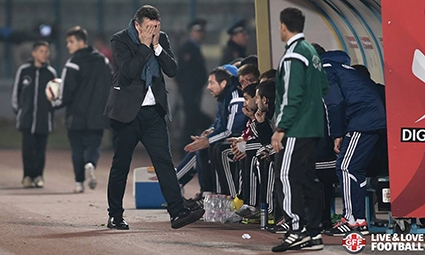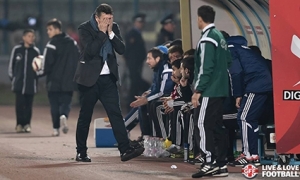Last Minute Tirana Collapse Signals End of Tskhadadze’s Honeymoon Period
When Kakha Tskhadadze took over the Georgian national football team at the beginning of the year, his immediate remit was to stop a deepening rot. His predecessor Temur Kestbaia left Georgia floundering well outside the world’s top 100, and already out of contention for Euro 2016 after only four qualifiers.
For a new head coach, entering such a bleak landscape can be viewed as both a curse and a blessing. On one hand, you inherit a poorly performing squad bereft of confidence but on the other hand, expectations are modest and, from a position so low, the only way is up.
The Rustavi-born 47-year-old could, indeed, point to steady improvement from his first months in charge, competing well twice against world champions Germany, pushing eventual qualifiers Ireland close in Dublin and of course shipwrecking Scotland’s Euro hopes with a 1-0 victory in early September.
In particular, the defensive solidity which characterized the relatively successful early days of the Ketsbaia reign appeared to have returned with the deployment of a five-man defence. Central defenders Guram Kashia, Saba Kverkvelia and Aleksandr Amisulashvili had been the foundation of Tskhadadze’s gradual progress.
However, a humbling 3-0 defeat in Estonia on November 11 and the surrendering of a two-goal lead in the final minutes of a 2-2 draw in Albania five days later mean that Tskhadadze’s Georgia end the year with as many questions as answers.
Kverkvelia was absent for the friendly double header, which could account for some of the sudden defensive fragility. His replacement Gia Grigalava, now at Cypriot club Paphos, is primarily viewed as a left-back and his performances reaffirmed that assertion.
The decision not to call up young central defender Lasha Dvali, who coped capably against Germany in Tbilisi in March, raised some eyebrows. Dvali instead took part for Georgia’s under-21s whose defeats to Spain and Sweden render their qualification for the European Championships more or less extinguished.
Another issue brewing for Tskhadadze’s Georgia is the goalkeeping position. The undisputed property of the towering Giorgi Loria for years, the number one jersey no longer has a fixed tenant.
Loria’s ill-fated summer move to Greek giants Olympiakos and subsequent release saw him relinquish his first-team place for Georgia’s match with Scotland on September 4. Replacement Nukri Revishvili, though barely tested by the Scots, kept a clean sheet and held on to his position for the remainder of the campaign.
That was until the visit to Tallinn to play Estonia last week where Loria was unexpectedly given a reprieve. Loria, now at Russian side Krylya Sovetov, could scarcely be blamed for any of Estonia’s three goals but was nonetheless dropped for the Albania match five days later.
The reinstated Revishvili produced some fine saves in game a largely dominated by Albania but one which Georgia ought to have won.
Amisulashvili’s softly struck volley crept past Albanian keeper Eltrit Berisha after less than 90 seconds to give Georgia a surprise lead, with Dusiburg attacker Giorgi Chanturia the supplier.
And Chanturia’s evening improved immeasurably shortly after half-time when a zipping shot from 20 meters doubled Georgia’s lead.
Ranked 75 places above Georgia and having already qualified automatically for the European Championships, Albania away represented a potentially noteworthy scalp for Tskhadadze regardless of the match being a friendly.
Victory certainly would have made amends for the sobering loss to Estonia, a nation that dropped points against San Marino in their limp Euro 2016 qualifying bid.
However, such a reprieve was denied in the closing stages as first Migjen Basha capitalized on a half-hearted clearance to drive past Revishvili from the edge of the box to halve Albania’s arrears before a spectacular volley by Sokol Cikalleshi in the fourth minute of stoppage time salvaged a draw for the hosts.
A 2-2 draw in Tirana would have been a perfectly palatable result for Georgia at kick-off, but the way in which it was achieved leaves Tskhadadze’s revival under some pressure.
There was some good news for Georgian football this week though as the under-19s reached the elite round of qualifying for the 2016 European Championships, as a 0-0 draw with Austria proved sufficient in the final qualification match in Tbilisi. They follow the under-17s who have also made the elite round, keeping up Georgia’s recent commendable record at youth level.
At the top level though, there remains a mountain of work to be done ahead of Georgia’s World Cup 2018 qualification campaign which kicks off next September against Austria in Tbilisi.
In a group also containing Wales, Ireland, Serbia and Moldova, Tskhadadze has earmarked third place as his target, an ambition which felt slightly more fathomable a fortnight ago than it does now.
Alastair Watt












